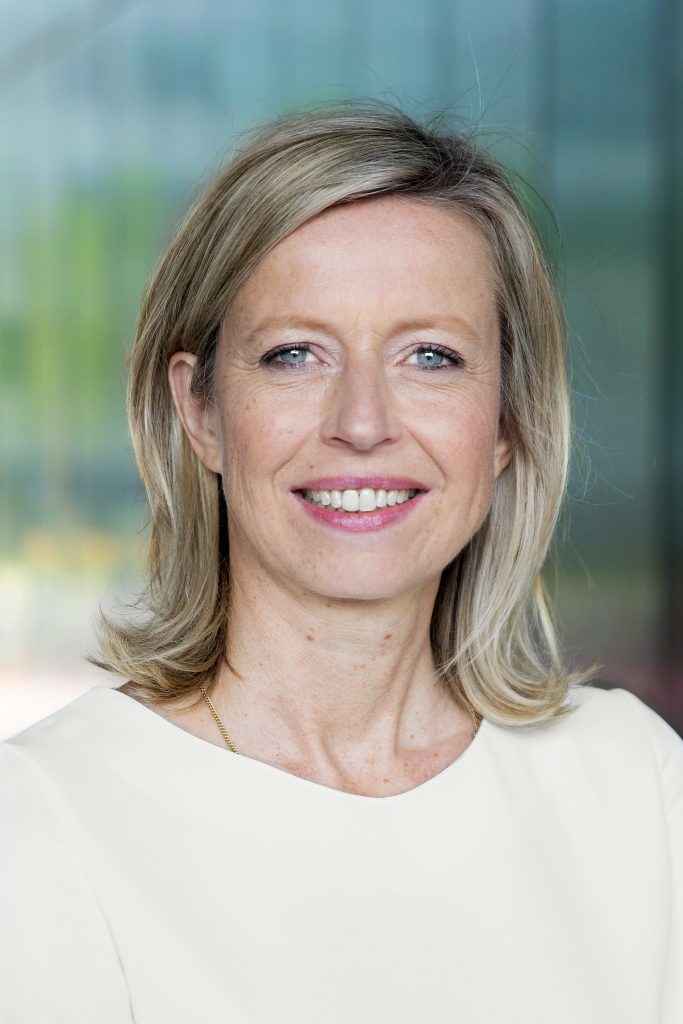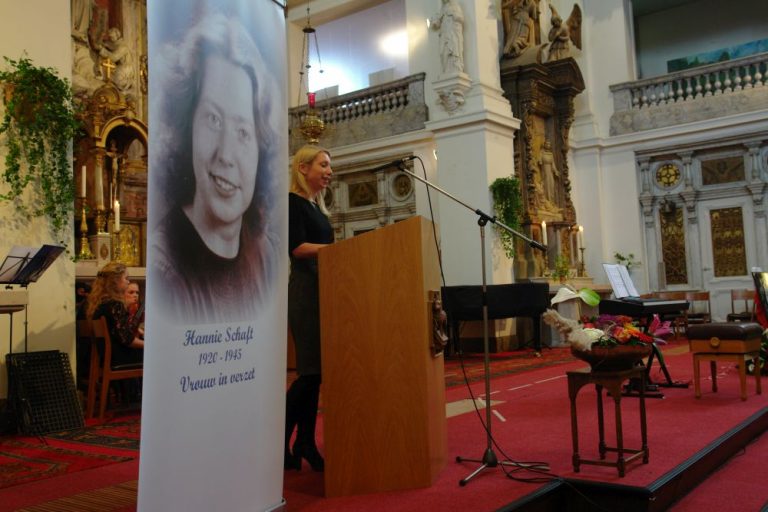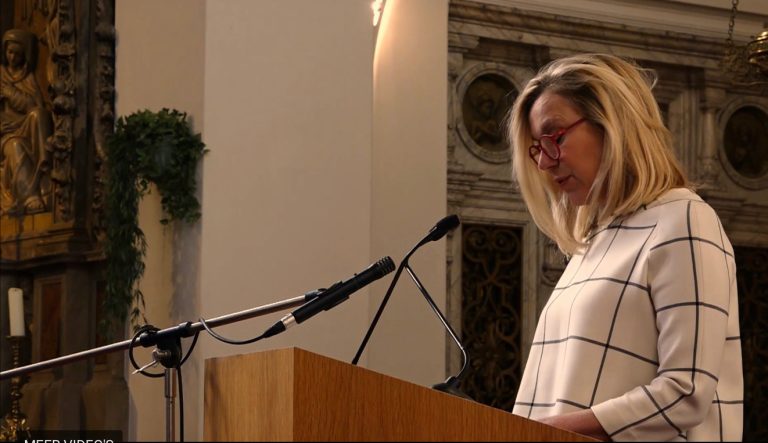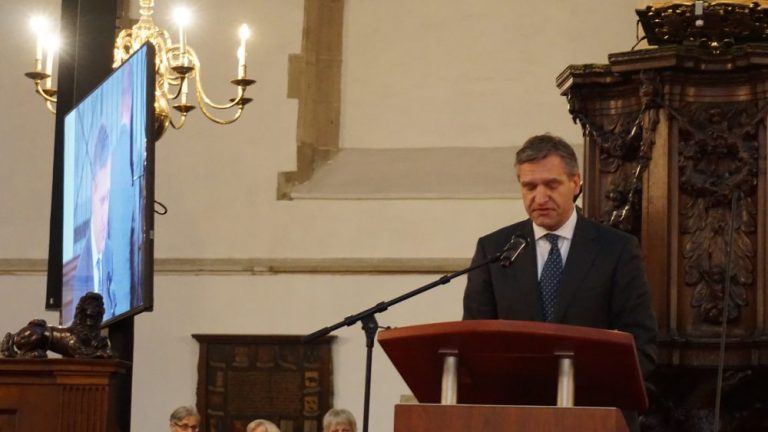The grey tones of peacetime

Dear members of the family of Hannie Schaft
Dear members of the family of Truus and Freddie Oversteegen,
Ladies and gentlemen, boys and girls
“War is not one single drama for millions of people. Instead war is a collection of millions of personal dramas.” These were the words of Hans van Mierlo at the National Remembrance Day in 2014. And one of those dramas is the drama of Hannie Schaft.
On Tuesday 17 April 1945, less than three weeks before the German capitulation, Hannie was bundled into a truck by five men at the detention centre in Amsterdam, and driven to the dunes at Overveen. She was just 24 years old. At one point the truck halted to pick up a soldier of the Feldgendarmerie, with a shovel in his hands. He told the driver where to drive to.
After a journey of less than an hour, the truck halted on a sand track not far from the beach in Overveen. From there, the Dutch detective Maarten Kuijper and the German Gestapo officer Mattheus Schmitz led her further into the dunes. The soldier with the shovel trudged along behind them. Soon afterwards, her far too short life was ended in a hail of bullets.
I often stroll through the dunes in Bloemendaal. I love the space and the quiet. As the large cross at the Memorial Cemetery looms into view, I often think of the Girl with the Red Hair and the other resistance fighters buried there. She is the only woman among 371 men. Her gravestone bears the words ‘She served’.
Following the liberation, to huge public acclaim, Hannie’s body was carried from the Sint Bavo church for reburial. Row upon row of people watched on as former resistance fighters bore the coffin with her remains to the Memorial Cemetery.
Hannie’s death was a tremendous blow for her family, her loved ones and her fellow comrades in arms. The life of a woman full of dreams and talent was ended all too soon.
A completely ordinary young woman who fell in love, who loved reading and who enjoyed spending time with her house mates. A woman of keen temperament, who could be spurred to anger in discussions and who was moved to tears when accompanying Jewish children to their safehouses.
Then – and still to this day – Hannie was an example. She was courageous and dauntless. Brave women like Hannie must be cherished.
Ladies and gentlemen.
During my youth, the war was never far away. Just like so may of you, I grew up with books such as Jan Terlouw’s Winter in Wartime and The Assault by Harry Mulisch. As I read them, I wondered to myself what I would have done in such extreme circumstances. Would I have helped people find a safe hiding place? Would I have distributed illegal news sheets? Would I have contradicted my teacher if he had expressed anti-Semitic opinions?
When I became a student, and by chance joined the same student association as Hannie, I heard about the Jewish professors who lost their jobs during the war. I was impressed by the many students who had refused to sign the declaration of loyalty to the occupying power.
Hannie dared to do all those things. Not because she was never afraid, but because she considered it to be her moral duty. You simply had no choice. She could not bear to watch as the world of her friends Sonja and Philine became ever more restricted.
They were no longer able to visit the park, the cinema or attend their studies. For Hannie, that situation was simply unacceptable. She drew the ultimate conclusion, and took to arms.
Every year we stop to consider her life, and the ongoing importance of her ideals. This year is a special year. Hannie – who actually went by the name Jo – was born one hundred years ago this year, in Haarlem. In this city where that meant so much to her.
Hannie fought for liberty and a society in which everyone has the right to participate. Her life teaches us that we must not look away from the fight against evil. We sometimes hear the expression: evil flourishes when good men do nothing. In that light, she is an inspiration to us all on the hundredth anniversary of her birth.
Ladies and gentlemen.
For Hannie, evil could be easily identified. Her moral boundaries were crystal clear. When she received the order to kidnap the children of Reichscommissar Seyss-Inquart, she refused, to the outrage of her commander. Even if they were the children of a senior Nazi, no harm should be done to innocent people.
Wartime and occupation place issues in a sharper perspective. The confrontation with a murderous regime makes everything black and white. But what is the relevance of Hannie Schaft’s heroic example in out lifetime?
The answer is not so easily found. Whereas we are able to reject Nazism in hindsight, the threats facing us today are more ambiguous. Instead of the black and white of wartime, we must deal with the grey tones of peacetime.
Those grey tones are for example reflected in the way we deal with populism. In countries where populist leaders are in charge, democracy is under pressure. They govern with no respect for the boundaries of the rule of law. Their criticism of the institutions designed to limit their powers is toxic. It causes people to doubt the neutrality of the law courts, the truthfulness of the media and the fairness of elections.
In Poland and Hungary we have seen dissenting judges set aside and critical newspapers and TV and radio stations closed down. We have looked on as President Trump complained about election fraud. And we have seen President Bolsonaro of Brazil flirting with the idea of a military coup.
The way we deal with populists is complex. They do not represent the absolute evil that Hannie Schaft fought against. Their electorate, however, often face real problems. They want affordable and safe housing, reasonable pay for their work, and a place for their mothers in a nursing home. It is essential that we listen to them, and search for solutions.
However, this does not mean we should give populists free rein. There certainly is a red line that may not be crossed. In Poland and Hungary, that line has been crossed through the systematic undermining of the independent judiciary, interference with independent journalism and the erosion of human rights.
In our country that same red line was crossed by an attack on the judiciary. One party used the pseudo-scientific term ‘dicastrocracy’ to hint at an attempt by the judiciary to seize power.
It goes without saying that politicians are entitled to criticise the judiciary. However, the situation changes when the independence of judges is cast into doubt. When they are accused of political meddling. At that point, the criticism is aimed at the judiciary as an institution, and marks the start of the erosion of the foundations of the rule of law.
The democratic rule of law, with an independent judiciary and democratically founded legislation, deserves a stout defence, and not imputation. Fortunately, human rights still apply in Poland and Hungary. They are firmly embedded in conventions like the European Charter on Human Rights.
However, criticism of the judiciary is not only directed from the flanks. The state-building parties, too, are calling for a restriction of the role of judges and limitations of European law. Conservative parties are even expressing the idea in their election manifestos that Member States should be permitted to correct judgements by the European Court in Strasbourg. In other words, that politicians should be able to set aside decisions taken by the courts.
They also wish to limit the possibility of litigating in the name of public interest. They for example argue that you should no longer be able to initiate legal proceedings if women are discriminated against by a company, an association or a foundation, unless you are personally a direct victim of that discrimination. In other words, if it is not a question of your direct personal interest, you should no longer have access to the courts. In such a world, who is the guardian of public interest?
It is a sign of a healthy democracy if foundations and associations are able to challenge the powers that be, by appealing to the courts. It is then up to the courts to judge whether the law, laid down by political means, has been violated.
The judgements of the courts must be implemented, even if they displease parliament or the Cabinet. It can be a painful experience, particularly for public administrators. However, in a democracy, there must always be room to dispute power.
In a dictatorship, a decision marks the end of discussion. In a democracy, it is the starting point. Anyone – rich or poor, young or old – can appeal to their elected representative, and sometimes the courts to respond to the holders of power in our country and in the European Union.
It is precisely through the division of powers that people are protected against the excesses of government. By providing a counterbalance to the power of government, a balance is achieved. I would say to my conservative friends: let us protect, preserve and pass on the principle of the division of powers to a new generation.
Democracy appears to be as self-evident as night following day. None of us seriously wonders whether the sun will come up again, tomorrow. Most of us, indeed, have never experienced any other form of government. The generation that lived through the occupation is gradually disappearing.
However, democracy is a sun that clearly can be extinguished. It is rarely a rapid process; far more commonly it is a gradual change. And it is for that reason that I stand up for the democratic rule of law, and call upon you to join me.
Thanks to the rule of law we are all able to live together in liberty and security . There are institutions that protect us against random treatment, discrimination and the law of the jungle, where might is right.
Ladies and gentlemen,
Emotion is part of politics and of our society. I understand the sense of outrage felt by people who have been done wrong. I recognise the anger of people who feel hurt. And I know how tempting it is to convince yourself of the rightness of your own ideas.
However, none of this can help us move on. Our small country has become great by demonstrating a degree of mutual trust. We choose compromise as a means of bridging our differences. We overcome difficulties by listening to each other.
By looking around us, we learn from our own mistakes, and seek inspiration from courageous people like Hannie Schaft. However, harking back to the good old days, when everything was allegedly so much better, changes nothing. The world can only be made a better place by remaining curious and by not turning our back on change and innovation.
My ideal is a society of people living in liberty. A free society not only means that people are guaranteed equal opportunities. It is also a society in which people do not live in fear. Where people dare to make their own choices and take responsibility for them. Where people dare to be themselves and are willing to speak out against injustice.
These are the principles for which Hannie Schaft fought and died. We can only fantasise about what would have become of her if she had survived the war. Hannie told her friends that she did not intend to sit at home like her mother, but that she wanted to help advance society as a working woman.
As a student, Hannie had specialised in international law. While at secondary school, she had written about the powerlessness of the League of Nations in the war in Abyssinia, the country that we now know as Ethiopia. After the war, Hannie had considered heading off to Geneva to breathe new life into the League of Nations.
Perhaps she would have found work in New York, where six months after her death the United Nations was established. Those same United Nations have often been pronounced dead, but the organisation is still very much alive and kicking. For 75 years, the United Nations have been striving for peace, liberty and equal opportunities, in the spirit of Hannie Schaft.
Hannie, however, never visited New York. Her life came to a dramatic end in 1945. We will never forget her. Today, one hundred years following her birth, we still commemorate her, and celebrate that she once lived. As long as we continue to do that, year in, year out, her ideals will live on.
Thank you.




